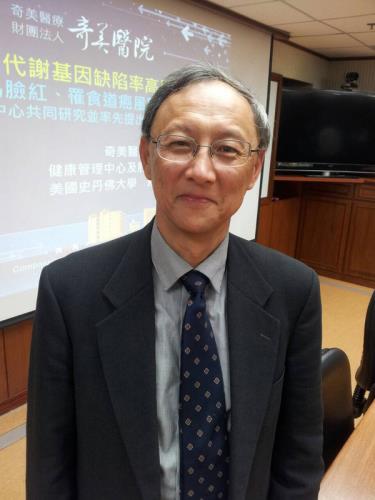【Special Lecture*Round Table Discussion】 Stanford × KMU × RCEM
Special Lecture*Round Table Discussion with Dr. Che-Hong Chen from Stanford University on October 23, 2018
【Special Lecture*Round Table Discussion】
Stanford × KMU × RCEM
史丹佛× 高醫× 環醫
The Research Center for Environmental Medicine will have the great honor to invite Dr. Che-Hong Chen from Dept. of Chemical and Systems Biology, Stanford University, School of Medicine, Stanford, CA, U.S.A. We will host a special lecture and round table discussion on October 23, 2018. Welcome to join the discussion, if you are interested in his research filed or going abroad for further research in the Stanford University. The detail informations are as followed:
環醫中心本月邀請美國史丹佛大學陳哲宏博士蒞校進行專題演講及學術交流,歡迎本校碩博士生、主治醫師、年輕教師或有興趣至史丹佛大學進修之人員共同參與討論
Date:
October 23, 2018 (Tue.) 12:00pm-13:00pm Special Lecture -Registration
「ALDH genetic variability and aldehyde toxicity-induced human disease 」
October 23, 2018 (Tue.) 13:30pm-15:30pm Round Table Discussion-Registration
Venue:
First Conference Room (2th floor), Li-Hsueh Building
勵學大樓二樓 第一會議室

Dr. Che-Hong Chen
Current Position:
l Senior Research Scientist (1993-present), Dept. of Chemical and Systems Biology, Stanford University, School of Medicine, Stanford, CA, U.S.A.
l CEO, ALDH2 STAR Research Consortium (2015-present)
Personal Statement:
Dr. Che-Hong Chen, a molecular biologist and geneticist, has been working as a senior research scientist at Stanford University, School of Medicine, for the past 26 years. Dr. Chen's early research includes the characterization of the first intra-cellular receptor for protein kinase C and its protein-protein interaction with other signaling molecules. Dr. Chen's past research interests focused on the role of ethanolmediated cardioprotection against ischemia-reperfusion injuries. These studies led to his discovery of the important detoxifying function of aldehyde dehydrogenase (ALDH) in the heart. More recently, Dr. Chen has been studying the ALDH gene family and its association with human diseases. By high-throughput screening of small molecule libraries, Dr. Chen pioneered the discovery of a class of novel enzyme activators and inhibitors of aldehyde dehydrogenase. His work has been published in high journals such as Science, Nature Structure and Molecular Biology, PNAS, Science Translational Medicine and Physiological Reviews. Together with Dr. Daria Mochly-Rosen at Stanford University, Dr. Chen co-founded ALDEA Pharmaceuticals in 2011 and Aviv Therapeutics in 2016 to translate these small molecular ALDH modulators for clinical applications. The ALDH program is currently under development by Foresee Pharmaceuticals based in Taiwan. Dr. Chen's goals are to further understand and to bring these ALDH modulators into therapeutics for human diseases that are associated with reactive and toxic aldehydes. One of the mutations in the ALDH gene family is the common East Asian-specific point mutation of ALDH2 which is present in nearly 560 million people or 8% of the world population and causes the wellknown Asian Alcohol Flushing Syndrome. The ALDH2 mutation leads to a deficiency in the capacity of aldehyde detoxification and is associated with high risks of acetaldehyde-induced cancers and other diseases. Using an ALDH2 deficient mouse model, Che-Hong is currently identifying new molecular and pathological targets that are susceptible to toxic and reactive aldehydes. Dr. Chen is an internationally recognized leader in basic and clinical research of aldehyde toxicity and genetic deficiency of ALDH2 and G6PD. He is also an expert in translational research for drug discovery and development and is often invited to speak in the U.S. and other countries including Japan, Brazil, Greece, China and Taiwan. Since 2015, Dr. Chen has initiated and served as the Chief Executive Officer of the Stanford-Taiwan ALDH2 Deficiency Research (STAR) Consortium. The STAR consortium is devoted to the promotion of multidisciplinary international collaboration of basic and clinical research on ALDH2 deficiency and its related diseases between Taiwan and Stanford University. The mission of the consortium also includes public health education and public awareness of ALDH2 deficiency, acetaldehyde toxicity and cancer prevention for the East Asian populations. More recently, Dr. has launched and founded a non-profit, citizen group called Taiwan Alcohol Intolerance Education Society (TAIES) to further advance the goal of ALDH2 deficiency education and public awareness on alcohol-related health issues in Taiwan.
Contact person 活動聯繫人:Eshine Chen 陳奕璇
E-mail 信箱:cheneshine@gmail.com

